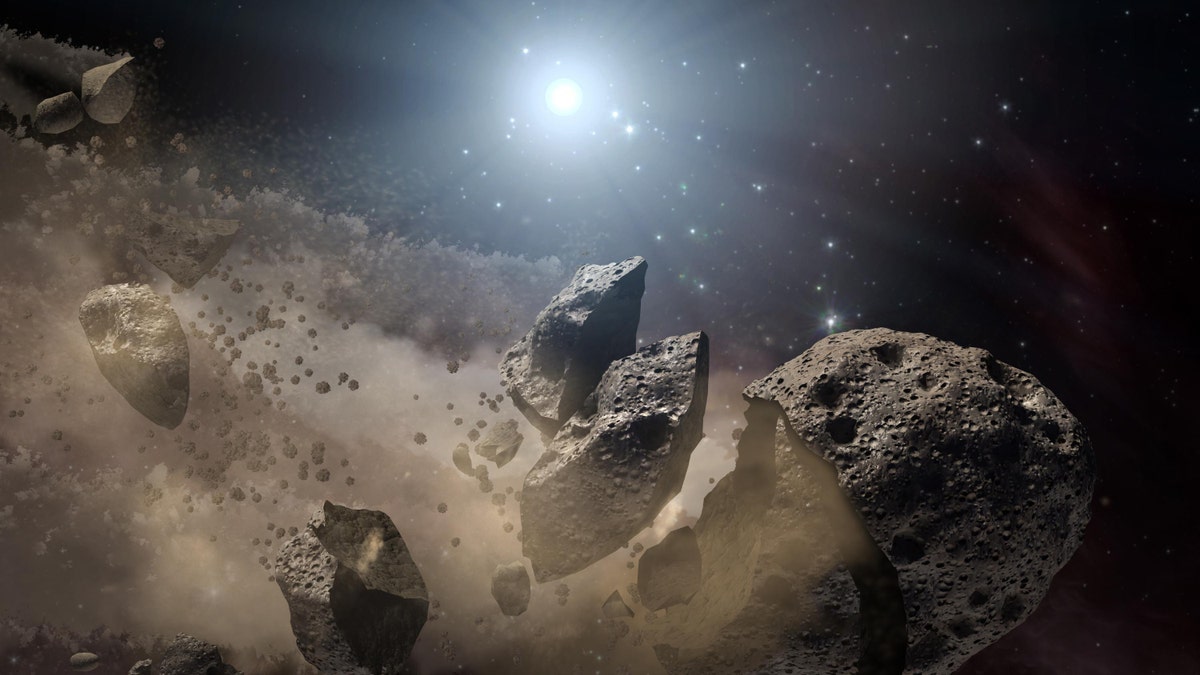
Image courtesy of NASA shows an artist's concept of a broken-up asteroid. (REUTERS/NASA/JPL-Caltech/Handout)
A mysterious asteroid that is moving the wrong way around Jupiter is turning heads this week as scientists reveal it's the first "interstellar immigrant" from beyond our solar system to stick around, according to a new study released Monday.
The 2-mile-wide asteroid, known as 2015 BZ509, is in retrograde — appearing to turn the opposite direction in relation to other planets within its solar system — around the gas giant's sun. It was just recently discovered around Jupiter’s co-orbital region, and stumped scientists who studied it.
“How the asteroid came to move in this way while sharing Jupiter’s orbit has until now been a mystery,” Dr. Fathi Namouni, lead author of the study, said in a statement online. “If 2015 BZ509 were a native of our system, it should have had the same original direction as all of the other planets and asteroids, inherited from the cloud of gas and dust that formed them.”
How long has it been here?
That was another question on every scientist's mind after the space rock was spotted in November 2014 by the Panoramic Survey Telescope and Rapid Response System (Pan-STARRS), Space.com explained. Now astronomers believe they finally have an answer: 4.5 billion years.
"[We can] show that asteroid (514107) 2015 BZ509 has been in its current orbital state since the formation of the Solar system," the study, published in the Monthly Notices of the Royal Astronomical Society, stated. "This result indicates that (514107) 2015 BZ509 was captured from the interstellar medium 4.5 billion years in the past as planet formation models cannot produce such a primordial large-inclination orbit with the planets on nearly coplanar orbits interacting with a coplanar debris disc that must produce the low-inclination small-body reservoirs of the Solar system such as the asteroid and Kuiper belts."
The exciting discovery comes just months after scientists found our first known interstellar visitor named "Oumuamua," Hawaiian for messenger from afar arriving first.
"Oumuamua is of interstellar origin but it is also only a tourist passing by our solar system," Namouni said. "BZ is not. It is a bona fide immigrant and the notion of immigration is a hot topic nowadays all over the world!"
This find makes scientists believe there are even more interstellar immigrants in our backyard.
"This result also implies that more extrasolar asteroids are currently present in the Solar system on nearly polar orbits," the study states.
Scientists are eager to study the asteroid, which they believe could hold answers about the origin and makeup of our own planet Earth.
By identifying more immigrant asteroids, Namouni said, scientists can determine their composition. If BZ contains water, for example, researchers can compare it with Earth's water and, perhaps, better understand how water originated here at home.
The Associated Press contributed to this report.







































